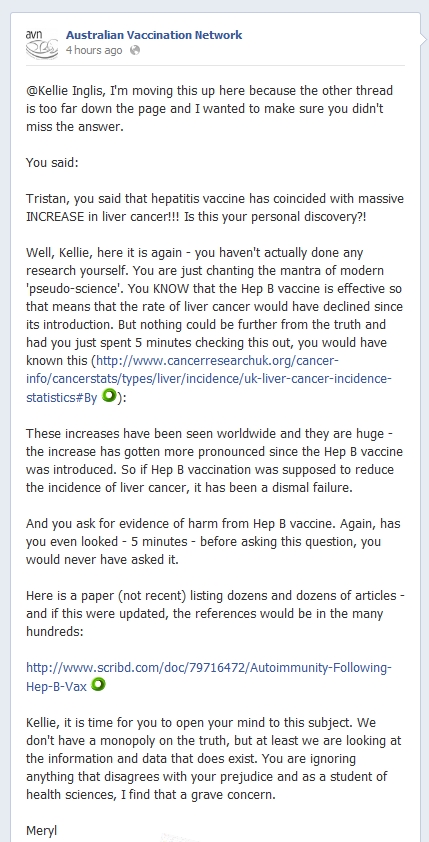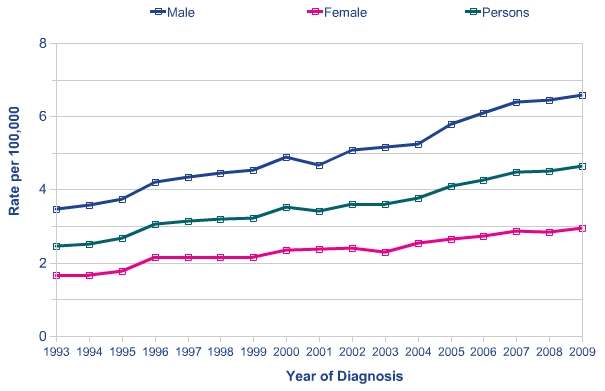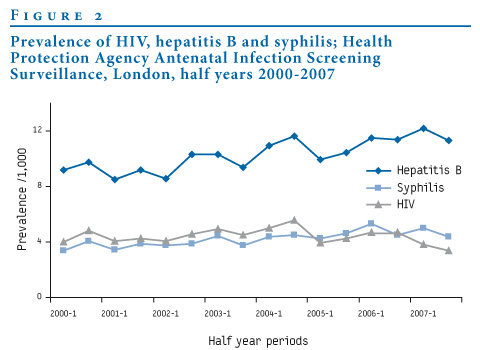One of the commentors over on the Australian Anti-Vaccination Network’s facebook page challenged the group’s president – Meryl Dorey – to comment on a hypothetical scenario as a way of discussing the utility of vaccination against Hepatitis B (Hep B). A conversation ensued and commentor’s question was never answered, however just last night Dorey posted the following comment on the AVN page:

Dorey’s condescending post – ‘5 minutes’ seems to be a recurring theme. (And how considerate to ensure the post she thinks is evscerating all Kellie’s points with evidence is easy to find at the top of the page! Just a shame she still hasn’t actually managed to get around to giving Kellie a direct answer)
…with this chart of liver cancer incidence in the United Kingdom:

Liver cancer rates in the UK by gender from 1993-2009 (Cancer Research UK)
Right now I’m going to focus on the claim of increasing liver cancer rates thanks to Hep B vaccination.
But first the rationale behind using the Hep B vaccine to prevent liver cancer:
- Hepatitis B is a virus that chronically infects liver cells.
- This chronic infection naturally leads to prolonged inflammation.
- A continual inflammatory state is conducive to cancer formation.
(The virus also seems to be able to integrate its DNA into host cells to cause cancer)
Therefore prevention of infection through vaccination should also prevent the resultant cancer.
Nice in theory – but is this borne out by the evidence?
In July 1984, Taiwan launched a vaccination program to cover infants born to Hep B carrying mothers. Then in 1986 the program was extended to all infants under 12 months, and over the coming seven years was extended up the age groups to cover adults 20 years and older. It just so happens that since 1979 Taiwan has also had a national cancer registry (with an unregistered rate estimated to be as low as ~4%). Some canny researchers utilised this database to determine the influence of the country’s Hep B immunisation policy on liver cancer rates over the 20 years it was in place. So what did they find?
Well, the relative risk of liver cancer for the vaccinated compared to the unvaccinated was calculated to range from 0.31-0.38, meaning the unimmunised were about three times more likely to develop the cancer.
So that’s pretty clear cut, using data that spans a country’s entire population, but what about other risk factors? Well firstly boys had a risk ratio for the cancer of 2.5 compared to girls, and having a Hep B positive mother was also a big predisposing factor. Notably, the number of doses of the vaccine also played a role, with those that received less than three doses having a greater incidence of the cancer (odds ratio = 4.32), further indicating the protective effect of the vaccine against liver cancer.
So, in our biggest, longest-running ‘phase 4’ trial of the vaccine, it’s clear the vaccine has succeeded in preventing liver cancer. So what about Meryl Dorey’s data?
Well let’s look at her figure, from the UK.
Yup, it definitely shows rising incidence of liver cancer. Not all that surprising, since (unlike in Australia or Taiwan) the UK’s National Health Service only recommends Hep B immunisation for high-risk groups. In fact, the link where Dorey got the figure from says [bolding mine]:
Trends over time
Liver cancer incidence rates have overall increased in Great Britain since the mid-1970s (Figure 1.2).1-3 For both men and women, European AS incidence rates increased by around three times between 1975-1977 and 2007-2009.
Much of this increase can probably be attributed to past changes in the prevalence of major risk factors for liver cancer, such as heavy alcohol consumption and infection with the hepatitis B and C viruses.7,8 Alcohol consumption increased in Britain during the 1990s, particularly in women, but the proportion of men and women drinking more than 21 and 14 units/week, respectively, has fallen since 2002.9 A corresponding fall in alcohol-related diseases, including liver cancer, might take a number of years to become apparent, due to the lag between alcohol consumption and related illness. For example, alcoholic liver disease takes approximately ten years to develop.10
In fact, I had a search for Hep B incidence rates in the UK and got this study. It looks at the rate of testing for various diseases during pregnancy in London, and the results of those tests. Sure, it’s not absolute prevalence rates, but it gives us an idea of the way the trend is heading.
Yep, you guessed it, it shows the rate of Hep B infection as being on the rise.
So I’m not exactly sure what Meryl Dorey was trying to prove with this one, other than that countries which haven’t implemented a large enough immunisation policy to control Hep B rates continue to see an increase in liver cancer – sort of the opposite of what she was saying. Also, it’s not surprising she failed to pass on the nuance regarding alcohol consuption causing liver cancer, or the lag between cause and effect – firstly Dorey is notorious for not reading her own sources, and personally I’ve found she only seems to understand nuance when it involves some convoluted justification of an anti-vaccine claim.
So what about Dorey’s ‘paper’? Well, as outlined in more detail in this facebook post, it’s a collection of references supposedly showing the dangers of Hep B and the vaccines against it. I started reading the papers (at least those that were actually on PubMed, and in English – hey, three out of six ain’t bad) and got three in. So far they were just case studies – in other words, a doctor noticed the rare, usually unexplained, disease they were treating occurred within a week after receiving a vaccine, so they write in to a journal, just so that information is out there. In short, the citations demonstrated that 1-2 people worldwide came down with some pretty bad illnesses following Hep B immunisation – rates that pretty much guarantee no association other than temporal. I didn’t read any more of the so-called ‘paper’, and instead satisfied myself by once more reading the RationalWiki entry on ‘Gish Galloping’.
However, I am now much more sympathetic to Meryl’s position. She said in 2009 she had been studying this issue for twenty years, and looking at the age of the references in this ‘paper’ it’s clear she simply just hasn’t had the time to get her hands on any new journals over the last two decades. I’m sure when the AVN release their next financial statement there’ll be the cost of a subscription to Vaccine or the New England Journal of Medicine on there, and Dorey’s posts will actually start to reflect the trials and research that have been published the last few decades.
To sum up, of the Hep B vaccine we can say that it is effective in preventing liver cancer, as well as Hep B infection; more doses give superior protection to fewer doses, and both are superior to no doses. Maybe someone should pass the memo to the NHS.
Of Meryl Dorey, what can we say? Well, her evidence of harm from the Hep B vaccine demonstrated to me that some very rare and very unpleasant conditions occur so infrequently after the shot that they simply don’t seem to be associated with it. As for Dorey’s knowledge on the Hep B vaccine… Well, her unfamiliarity with the many controlled studies of the shot, her apparent ignorance that the UK does not immunise all infants, and her belief that the vaccine increases your odds of liver cancer… Well, let’s just say that maybe Dorey was revealing more than she intended regarding her research technique when she told Kellie it would only take five minutes to look this all up.


Reblogged this on littlepowder.
this is definitely going to result in a banning! well said.
Reblogged this on Losing In The Lucky Country and commented:
Essential reading from @kill3rTcell. An excellent review of the preventative impact on liver cancer provided by the full sequence of the Hepatitis B vaccine schedule. Includes a thorough deconstruction of the disinformation frequently pushed by Australia’s Anti-Vaccination Network that the vaccine is ineffective in this regard or (no surprise) is the “cause” of increasing hepatitis B infection.